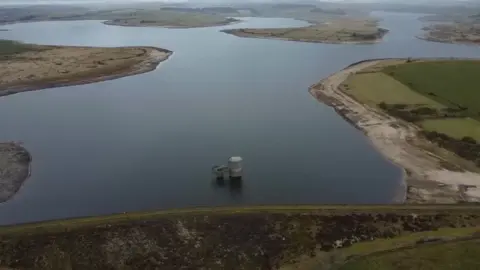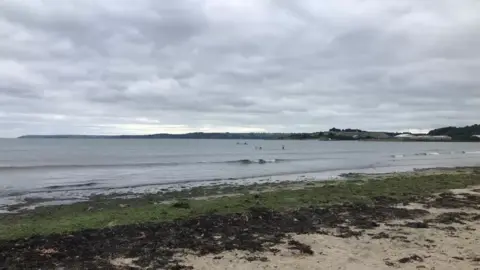Will 2024 see South West Water break the cycle of drought?
 BBC
BBCIn 2023 a year-long hosepipe ban ended, so what does 2024 hold for the South West's water?
Utility company South West Water (SWW) said it was "on track" for its two biggest strategic reservoirs, Colliford in Cornwall and Roadford in Devon, "to recharge to 90% capacity in March 2024".
It provides water and sewerage services to Devon and Cornwall, plus small parts of Dorset and Somerset and also the Bristol Water area.
South West Water said it was "working hard to make improvements… that will benefit our region long into the future".
The company added it was working to "break the cycle of drought".
The hosepipe ban that had been in place in parts of Devon and Cornwall for more than a year was lifted in September 2023.
Catherine Jones, from the Consumer Council for Water, said: "We need to see a safe, resilient water supply so that we don't have a 12-month hosepipe ban".
'Sewage scandal'
Cornwall could have a desalination plant built in 2024 to produce drinking water from seawater.
The plan for Par Docks, near St Austell, has been criticised in the past by organisations including Greenpeace.
They said the company should prioritise "fixing leaks".
SWW said the proposed scheme would provide "climate independent sources of water".
Pollution campaigners have called on SWW to "take a grip of the sewage scandal" in 2024.

Cornwall-based Surfers Against Sewage CEO Giles Bristow said: "SWW has been bumping along the bottom really.
"It is one of the worst-performing water companies in England for environmental performance and this is its moment to step up and take a grip of the sewage scandal."
He called for a "massive investment" in sewage infrastructure focused on "sites and other places where people enter the water for swimming or surfing and for high priority nature sites".
SWW said it was "tackling the use of storm overflows", which can have their capacity exceeded during heavy rainfall and result in the discharge of excess wastewater and sewage into the sea and rivers.
It added: "We continue working to reduce pollutions and target zero serious pollutions by 2025."
The latest Environmental Performance Assessment (EPA) by the Environment Agency, for 2022, gave SWW two stars, which means it "requires improvement".
It was ranked as one star in 2021.
SWW said it was "focused on achieving the maximum four-star EPA rating for 2024" which is due to be announced in 2025.

Follow BBC Cornwall on X (formerly Twitter), Facebook and Instagram. Follow BBC Devon on X (formerly Twitter), Facebook and Instagram. Send your story ideas to [email protected].
